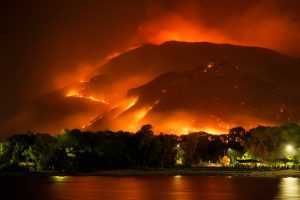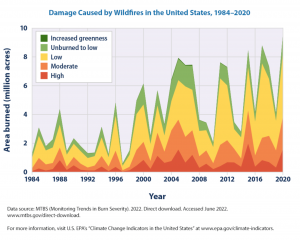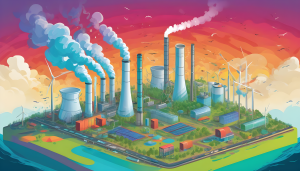
Wildfires are becoming increasingly frequent and severe around the world. This is due to a number of factors, including climate change, drought, and human activity. Wildfires can have a devastating impact on communities, destroying homes and businesses, and displacing residents. They can also cause serious health problems, as wildfire smoke contains a variety of pollutants that can irritate the lungs and airways and worsen existing health conditions.
Wildfire smoke can travel long distances, and even people who live far away from a wildfire can be exposed to its harmful effects. Wildfire smoke can also worsen air quality in cities, and contribute to smog and other pollution problems.

The chart shows that the number of acres burned by wildfires in the US has increased steadily over the past two decades. In 2000, wildfires burned just over 3 million acres. By 2020, that number had increased to over 10 million acres.
As climate change continues to warm the planet, we can expect to see more frequent and severe wildfires in the future. It is important to be aware of the risks of wildfire smoke and to take steps to protect yourself and your family.
This article will provide comprehensive information on wildfire smoke, including its health effects, prevention tips, and how to clean your home after wildfire smoke exposure.
Table of Contents
ToggleWildfire smoke contains a variety of pollutants, including:
- Particulate matter (PM): PM is a mixture of solid particles and liquid droplets found in the air. It can come from a variety of sources, including car exhaust, industrial emissions, and wildfires. PM can irritate the eyes, nose, and throat, and cause a variety of respiratory problems, including asthma attacks, bronchitis, and pneumonia.
- Carbon monoxide (CO): CO is a colorless, odorless gas that is produced when carbon fuels are burned incompletely. CO can bind to hemoglobin in the blood, preventing it from carrying oxygen to the body’s tissues. This can lead to a variety of health problems, including headache, dizziness, nausea, and chest pain.
- Nitrogen dioxide (NO2): NO2 is a reddish-brown gas that is produced when fossil fuels are burned. NO2 can irritate the lungs and airways, and cause a variety of respiratory problems, including asthma attacks, bronchitis, and pneumonia.
- Other pollutants: Wildfire smoke can also contain other pollutants, such as benzene, formaldehyde, and ozone. These pollutants can cause a variety of health problems, including cancer, reproductive problems, and neurological problems.
The health effects of wildfire smoke exposure on different populations.
Wildfire smoke exposure can have a serious impact on the health of people of all ages. However, certain populations are at an increased risk for developing health problems from smoke exposure, including:
- Children: Children’s lungs are still developing, and they are more susceptible to the effects of wildfire smoke. Smoke exposure can increase children’s risk of developing asthma and other respiratory problems.
- The elderly: The elderly are also at an increased risk for developing health problems from smoke exposure. This is because their lungs may be weakened by age and disease. Smoke exposure can increase the risk of heart attack, stroke, and pneumonia in the elderly.
- People with existing health conditions: People with existing health conditions, such as asthma, heart disease, and chronic obstructive pulmonary disease (COPD), are at an increased risk for developing health problems from smoke exposure. Smoke exposure can worsen these conditions and make them more difficult to manage.
Tips for protecting yourself from wildfire smoke while at work or school:
- Talk to your employer or school administrator about their wildfire smoke preparedness plan.
- If possible, work or study from home on days when air quality is poor.
- If you must go to work or school, wear a NIOSH-approved N95 or better respirator.
- Take breaks in clean air throughout the day.
- Drink plenty of fluids to stay hydrated.
How to clean your home after wildfire smoke exposure?
After a wildfire, your home may be contaminated with smoke and ash. To clean your home, follow these steps:
- Open all doors and windows to ventilate your home.
- Vacuum all surfaces, including floors, furniture, and drapes.
- Clean all hard surfaces with a damp cloth.
- Wash all bedding and clothing in hot water.
- If you have an air purifier, run it continuously on the highest setting.
Conclusion
Wildfire smoke can have a serious impact on your health. By taking steps to protect yourself and your home, you can reduce your risk of developing health problems from smoke exposure.
The financial impact of wildfire smoke
Wildfire smoke can have a significant financial impact on individuals and communities. For example, people who are exposed to wildfire smoke may experience increased medical costs, lost wages, and property damage. Wildfire smoke can also have a negative impact on tourism and other industries.





